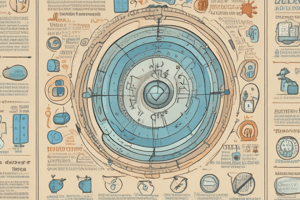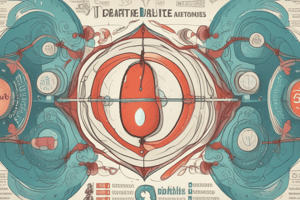Podcast
Questions and Answers
What is the primary cause of Type 1 diabetes?
What is the primary cause of Type 1 diabetes?
- Obesity
- Genetic factors
- Dietary choices
- Abnormal immune response (correct)
Insulin injections cure Type 1 diabetes.
Insulin injections cure Type 1 diabetes.
False (B)
What are two common symptoms of Type 1 diabetes?
What are two common symptoms of Type 1 diabetes?
Hunger and excessive thirst
Type 1 diabetes accounts for ______ percent of diabetes cases.
Type 1 diabetes accounts for ______ percent of diabetes cases.
Match the term to its description:
Match the term to its description:
What is characterized by high blood-glucose levels and insulin resistance during pregnancy?
What is characterized by high blood-glucose levels and insulin resistance during pregnancy?
Individuals with prediabetes do not have an increased risk for Type 2 diabetes.
Individuals with prediabetes do not have an increased risk for Type 2 diabetes.
What percentage of adults over the age of sixty-five have prediabetes?
What percentage of adults over the age of sixty-five have prediabetes?
Patients with Type 2 diabetes have cells that have become resistant to ______.
Patients with Type 2 diabetes have cells that have become resistant to ______.
Match the following diabetes-related terms with their definitions:
Match the following diabetes-related terms with their definitions:
What is the primary approach for treating Type 2 diabetes?
What is the primary approach for treating Type 2 diabetes?
Chronically high glucose levels can have severe long-term health consequences.
Chronically high glucose levels can have severe long-term health consequences.
What are two common symptoms of high blood glucose (hyperglycemia)?
What are two common symptoms of high blood glucose (hyperglycemia)?
Type 2 diabetics may need ______ injections as their condition progresses.
Type 2 diabetics may need ______ injections as their condition progresses.
According to the Diabetes Prevention Trial, what percentage did intensive lifestyle intervention reduce the chance of getting Type 2 diabetes?
According to the Diabetes Prevention Trial, what percentage did intensive lifestyle intervention reduce the chance of getting Type 2 diabetes?
Flashcards are hidden until you start studying
Study Notes
Diabetes Overview
- Diabetes is a metabolic disease characterized by insulin deficiency and glucose over-sufficiency.
- Genetics, nutrition, environment, and lifestyle all contribute to diabetes risk.
- Maintaining an optimal body weight through a balanced diet is crucial for reducing diabetes risk
- Three main types of diabetes exist: Type 1, Type 2, and Gestational diabetes.
Type 1 Diabetes
- Type 1 diabetes involves the immune system attacking insulin-producing cells in the pancreas.
- Typically diagnosed before age 30.
- Symptoms include: hunger, excessive thirst and urination, and rapid weight loss.
- Insulin injection is the only treatment to prevent life-threatening complications.
- Untreated Type 1 diabetes can lead to ketoacidosis, a life-threatening condition with symptoms of vomiting, dehydration, rapid breathing, confusion, and eventually coma and death.
- Insulin injections prevent death but do not cure the disease.
- Type 1 diabetics require a strict diet low in rapidly-digested carbohydrates (high-GI foods), regular carbohydrate counting, and frequent small meals.
- Regular exercise helps manage blood glucose levels.
- Type 1 diabetes accounts for 5-10% of diabetes cases.
Type 2 Diabetes
- Type 2 diabetes is characterized by insulin insufficiency, but it is also caused by resistance in muscle, liver, and fat cells to insulin.
- Onset of symptoms is more gradual than Type 1 diabetes.
- Type 2 diabetics initially produce more insulin to compensate for resistance.
- As the disease progresses, insulin-producing cells become exhausted and die, leading to a requirement for insulin injections.
- Lifestyle interventions, including a healthy diet and increased physical activity, are the first-line treatment.
- Genetics, environment, nutrition, and lifestyle all contribute to Type 2 diabetes risk.
- The Diabetes Prevention Trial demonstrated that intensive lifestyle interventions reduced the risk of developing Type 2 diabetes by 58%.
- Type 2 diabetes accounts for 90-95% of diabetes cases.
Gestational Diabetes
- Gestational diabetes develops during pregnancy due to hormonal changes affecting insulin sensitivity.
- Risks include pregnancy complications.
- It typically resolves after pregnancy but increases the risk of developing Type 2 diabetes later.
- Gestational diabetes can increase the risk of obesity and Type 2 diabetes in the child.
Prediabetes
- Prediabetes is a condition with moderately high glucose levels, but not meeting diagnostic criteria for diabetes.
- Individuals with prediabetes are at increased risk for Type 2 diabetes and cardiovascular disease.
Diabetes Prevalence and Long-Term Health Consequences
- In 2013-2014, approximately 3 million Canadians (8.1% of the population) were diagnosed with diabetes.
- Diabetes is the leading cause of new cases of blindness, lower-limb amputations, and kidney failure.
- Diabetics are at a 2-4 fold increased risk of dying from cardiovascular disease.
- Many experience peripheral neuropathy, characterized by muscle weakness, loss of feeling, and pain in the lower extremities.
- Recent evidence suggests an increased risk of Alzheimer's disease in diabetics.
Diabetes Treatment
- Maintaining blood glucose levels within the target range (70-130 mg/dL before meals) is crucial.
- Monitoring blood glucose levels using a meter, strict adherence to a healthy diet, and increased physical activity are key.
- Type 1 diabetics begin insulin injections immediately upon diagnosis.
- Type 2 diabetics may require oral medications and insulin injections to manage blood glucose levels.
- High blood glucose (hyperglycemia) symptoms include increased thirst and frequent urination.
- Low blood glucose (hypoglycemia) is more common in Type 1 diabetics.
- Hypoglycemia symptoms include shakiness, sweating, nausea, hunger, fatigue, confusion, irritability, stupor, seizures, and coma.
- Hypoglycemia is treated rapidly by consuming fast-releasing carbohydrates.
- Reactive hypoglycemia, a condition of sensitivity to sugars, refined starches, and high-GI foods, can lead to hypoglycemia symptoms.
Lifestyle Modifications for Diabetes Management
- Weight loss, even as little as 9 pounds (4 kilograms), can improve blood glucose levels in Type 2 diabetics.
- The Diabetes Prevention Trial demonstrated that a diet of 1,200-1,800 kilocalories per day with less than 25% dietary fat and at least 150 minutes of physical activity per week led to 7% weight loss and significantly reduced the risk of developing Type 2 diabetes.
Metabolic Syndrome
- Metabolic syndrome involves three or more risk factors for Type 2 diabetes and cardiovascular disease.
- Characteristics include central obesity, high triglycerides, low HDL, elevated blood pressure, and fasting blood glucose levels.
- Prevalence is estimated at 20-25% of adults worldwide.
- Individuals with metabolic syndrome have a 9-30 times greater chance of developing Type 2 diabetes compared to those without the syndrome.
Studying That Suits You
Use AI to generate personalized quizzes and flashcards to suit your learning preferences.




